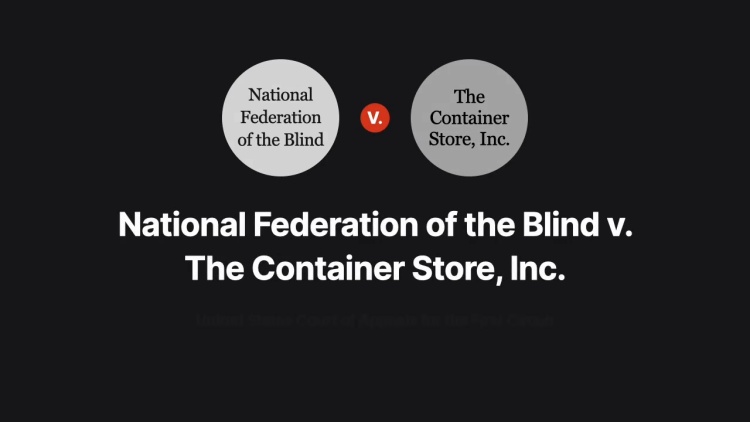National Federation of the Blind v. Container Store, Inc.
United States Court of Appeals for the First Circuit
904 F.3d 70 (2018)

- Written by Mary Phelan D'Isa, JD
Facts
The National Federation of the Blind (NFB) (plaintiff) brought a class-action lawsuit in federal district court against the Container Store, Inc. (the store) (defendant) on behalf of blind customers who shopped in-store (the in-store class members) and were signed up for the store’s loyalty program and a blind customer who signed up for the loyalty program online at home, alleging numerous violations of the Americans with Disabilities Act. The terms and conditions of the program included a class-action waiver and an agreement to arbitrate, which the store had a unilateral right to modify at any time. The in-store class members alleged that they were not given notice, constructive or otherwise, of these terms when they enrolled because of the store’s exclusive use of visual touchscreen interfaces and lack of tactile keypads on its point-of-sale devices, which meant those customers had to verbally disclose their enrollment information to store clerks, who did not inform in-store class members of the program’s terms and conditions when the clerks enrolled them. The online customer did dispute that she clicked accepting the terms and conditions, and she contended that there was a lack of consideration. The store sought to enforce the arbitration and class-action-waiver provisions against both sets of plaintiffs. The store produced no evidence that the store clerks informed the in-store class members of the terms and conditions of the loyalty program when they were signed up. Applying Texas contract law, the district court denied the store’s motion as to the in-store customers because it found they were never given notice of the program’s terms and conditions and as to the online customer because the agreement was illusory as to all plaintiffs. The store appealed.
Rule of Law
Issue
Holding and Reasoning (Thompson, J.)
What to do next…
Here's why 909,000 law students have relied on our case briefs:
- Written by law professors and practitioners, not other law students. 47,100 briefs, keyed to 997 casebooks. Top-notch customer support.
- The right amount of information, includes the facts, issues, rule of law, holding and reasoning, and any concurrences and dissents.
- Access in your classes, works on your mobile and tablet. Massive library of related video lessons and high quality multiple-choice questions.
- Easy to use, uniform format for every case brief. Written in plain English, not in legalese. Our briefs summarize and simplify; they don’t just repeat the court’s language.





